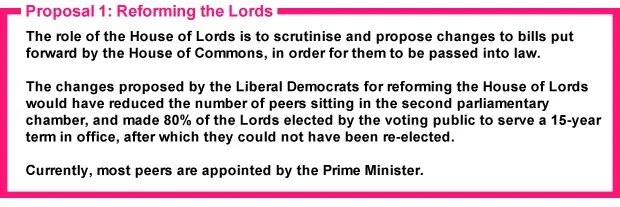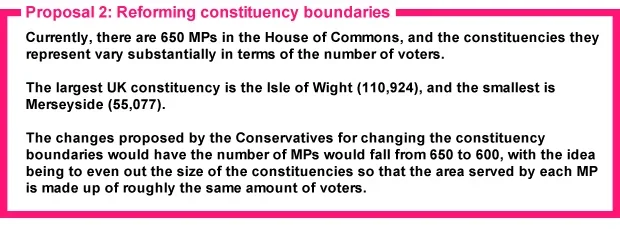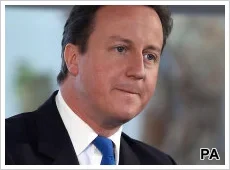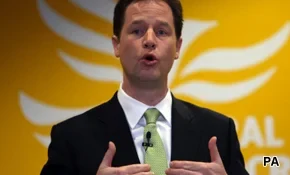Nick Clegg, the Deputy Prime Minister and Liberal Democrat leader, recently announced that plans to reform the House of Lords were to be abandoned, following opposition from Conservative backbench MPs. He also said that as a result, he would be instructing his party to vote against proposed boundary changes that would reduce the number of MPs elected to the House of Commons. Mr Clegg said his Tory coalition partners had “broken the contract” that the two political parties entered into when they agreed to form government together, back in 2010.
In light of the coalition’s wrangling over the policy exchanges at the heart of its partnership, YouGov’s Politics Lab wanted to find out what you thought to the prospect of Lords reform, and shake-ups to constituency boundaries.
We asked you to tell us which of the two proposals – House of Lords reform versus shaking up the Commons – you thought was more of a priority for passing into law. Or, if you felt neither set of reforms warranted driving through, why this was.


Q: Between reforming the House of Lords, and reforming constituency boundaries, which (if either) do you think is more of a priority?
The largest proportion of those who took part in the discussion said they felt boundary reform was more of a priority in their eyes, than reforming the House of Lords to make it 80% elected:
- Those who were of this view argued that the House of Commons, as the UK’s primary legislative body, was more important than the House of Lords, and therefore ensuring that individuals’ votes are of roughly equal value is more of a priority.
The second largest proportion of participants said that neither House of Lords reform, nor constituency boundary changes was presently a priority:
- You argued that there were more pressing issues politicians could be dealing with, even if you agreed with the thrust of the proposed reforms.
- Many of you also held concerns with the substance of the proposals, with some arguing that the boundary changes had only been suggested as a way of benefitting the Tories, while others said the proposed changes to the Lords would not do much to improve the institution.
The third largest group of those who had their say said for them, reforming the House of Lords was the higher priority:
- These participants tended to argue that it was not right that an entity with influence over legislation should be comprised of people who were selected based on political patronage, or hereditary privilege, rather than being elected.
And finally, the smallest group of participants said that the prospect of reforming the House of Lords and constituency boundaries, to reduce the number of MPs, were of equal importance:
- You often argued that making an unelected body more democratic, and tweaking the boundaries so that all votes carry roughly equal weight, are both important moves that will make democracy in the UK function better.
Click on the headings below to read the range and variety of comments made by panellists in Labs
VIEWPOINT: I think BOUNDARY REFORM is more of a priority'
“The House of Commons is not representing the electorate in a balanced way. There are too many MPs, and they should be cut to at least 450. Each MP’s area should be commensurate with all other MPs’ areas” Alison, Aberdeenshire
“The House of Lords works, so we do not need to change it – it isn't broken. There are too many MPs, and reducing there number will help cut the National debt” Anon

“The present House of Commons is cumbersome and inefficient ad needs a fairer distribution of parliamentary seats. The House of Commons is our elected body. As WS Gilbert (of Gilbert and Sullivan) said about the House of Lords – “do nothing in particular and do it very well" – so leave House of Lords as is” Davie, Hampshire
“The House of Commons is the house that enacts legislation and makes final decisions that affect the country. The current boundaries were formed some time ago and the demographics have changed. Ideally, each MP should represent an equal number of voters, this is not currently so. Clearly it would be an advantage both financially and organisationally to have less MPs; the lesson from other countries who manage with representatives having a higher number of constituents is that the system works” George, Bristol
“Constituency reform – to balance out the number of electors per constituency – is a necessary adjustment to account for the changing demographics of the nation, and to ensure that all votes remain at least nominally equal. By contrast, whilst Lords reform is certainly a good idea, the outgoing proposal was a very bad idea which, if anything, would have increased party political patronage in the Lords and made it less democratically accountable. Lords reform is not urgent, and becomes even less urgent when the model to be applied is so bad” Norm, Bristol
“It improves people's belief that their votes are of equal value. We need to improve participation in democracy – there is no point in having an elected Lords while many people feel so disenfranchised that they don't bother voting for existing elected bodies” William G, Omagh
VIEWPOINT: 'I think NEITHER Lords reform, nor boundary reform, are priorities'
“They are both about feathering politicians’ nests. I want Lords and boundary reforms as much as the next girl, but these proposals were about getting a cushy ride for Tory MPs not serving the country. I'd much rather the Lib Dems had dug their heels in on the vicious and evil attacks on the disabled in the benefits cull. Tackle the pressures on the disabled and poor, not the troubles of the rich in getting richer” Dee D, Yorkshire
“The House of Lords reform is a farce; it not only removes some of the best experts in either house in the form of the cross-benchers, and makes the Upper House far more party political. It also divides the House between those elected and those not. … I think there is merit to lowering the number of members of the House of Commons. However, we have more important issues to deal with at the moment” Anon
“There are many, many more important issues which should be taking every available second of parliamentary time” EM, Edinburgh
“I am totally against boundary change. It is designed to favour the Tories. I don't care about the Lords” Eaningguy, London
“There are much higher priorities, sorting out the economy for one. Boundary changes only really affect MPs; shrinking the size of their club and making it slightly possible to higher number of Conservative wins. Reducing the number of seats is reducing the number of contributors to debates. Lords reform will just create a different flavour of MPs club, and will have just as many issues as well as benefits as the existing setup” Peter C, Hertfordshire
“Reducing constituency sizes is simply an attempt to rig the proportion of seats that favour the Conservative Party in the House of Commons. With regards to the House of Lords, the problem is not that there should be no reform, but that the reforms put forward by the Deputy Prime Minister were the wrong ones. A 15-year single term senator is as bad as appointing someone undemocratically. There is no incentive to be accountable because you cannot be re-elected” Ben K, London
VIEWPOINT: 'I think LORDS REFORM is more of a priority'
“We live in a democracy and the House of Lords should reflect that; it is currently open to abuse as these people are not elected yet hold great power” Anon
“Too much power is given to unelected rich people, with peerages awarded by the government to their cronies” Anon

“The Lords is an undemocratic institution with the right to have an impact on legislation. This is anomalous in a country which claims to be a democracy. Whilst the unevenness in the size of parliamentary constituencies is also an anomaly, this does not have the consequence of being undemocratic. As for the proposed reduction of the number of seats from 650 to 600, the latter figure is just as arbitrary as the first” Anon
“We must get rid of these born-to-rule elite, which are unelected and are often there only as payback for services to political parties. As for the clergy in the lords, how bloody stupid is that?” Anon
“House of Lords reform has been on the agenda for over 100 years, and it's high time that we removed this undemocratic old boy's club from having excessive influence over the law of the land. Of course, it's no wonder the Tories won't act since it is the natural habitant of most of their rich buddies” Anon
“I believe this is the first step of constitutional reform and is essential if we are to have the correct checks and balances in our system. An elected House of Lords would mean that all those wishing to be elected would be more accountable, and the public would in fact elect the country’s political officers. This would move us more towards the system in the USA with all politicians being elected by and responsible to the people” David G, Driffield
VIEWPOINT: 'I think Lords reform and boundary reform are EQUALLY important'
“Both actions make the UK government a fairer machine and more responsible to the electorate” Anon
“Reduction in MPs is an economical need. They hold less power now due to Brussels, so we don't need so many. It would be better to have MPs representing the same number of people. On Lords reform, there should be more elected members to make it democratic, and to avoid the idea of 'cronyism' from the PM. What we should be encouraging is a totally independent House that can look critically at the potential laws, from an objective view rather than a party political view. It should be dynamic, and a restricted period in the House is a good way of keeping it vibrant – the same should go for MPs!” Anon
“I think the House of Lords should be reformed, because the public should have a say in its governance as well. Cutting the numbers of MPs from 650 to 600 would ensure that unnecessary government expenses would be reduced. The constituency population to MP ratio is a good idea too, for making a good local government” Osmi, Manchester
“The Lords are pretty pointless and out of touch, but the boundaries need sorting out as well” GD, Warwickshire
“There are too many politicians in both houses, and the cost to the taxpayer also needs to be addressed” Laurent, London
“Both are critical to the better governance of the country” Anon
Which of the two proposed reforms do you think is most important?
And if you could change one thing about Britain’s democratic system, what would it be?







